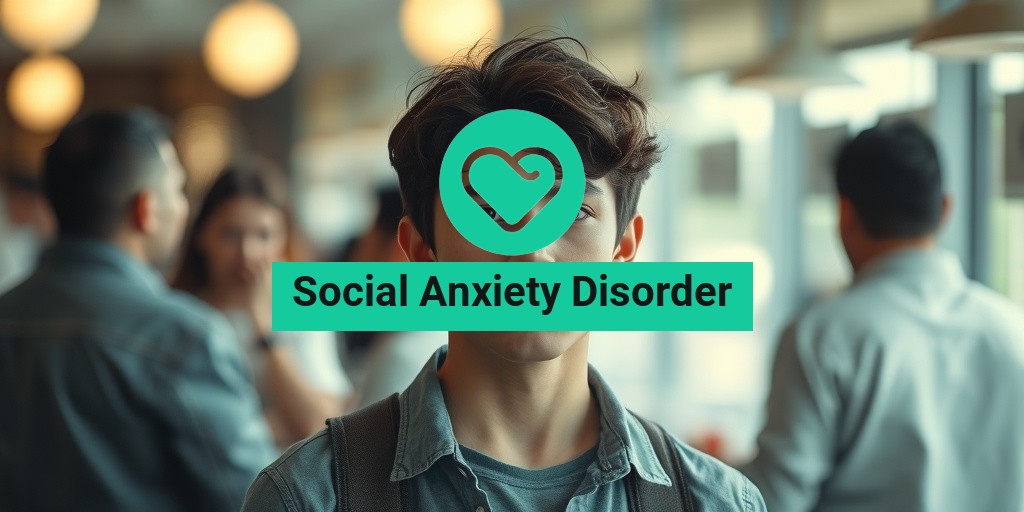What Is Social Anxiety Disorder?
Social Anxiety Disorder (SAD), also known as social phobia, is a common mental health condition characterized by an intense fear of social situations. Individuals with this disorder often experience overwhelming anxiety in situations where they may be judged, embarrassed, or scrutinized by others. This fear can be so debilitating that it interferes with daily activities, relationships, and overall quality of life.
The definition of social anxiety disorder encompasses a range of symptoms and behaviors. According to the DSM-5 (Diagnostic and Statistical Manual of Mental Disorders, Fifth Edition), individuals with SAD typically fear social interactions, such as speaking in public, meeting new people, or even eating in front of others. This fear is often disproportionate to the actual threat posed by these situations.
Social anxiety disorder can affect anyone, regardless of age or background. However, it often begins in childhood or adolescence, making it crucial for parents and educators to recognize the signs early on. In children, symptoms may manifest as extreme shyness, avoidance of social activities, or physical symptoms like stomachaches when faced with social situations.
Social Anxiety Symptoms
Recognizing the symptoms of social anxiety disorder is essential for seeking appropriate treatment. Here are some common symptoms that individuals may experience:
- Intense Fear of Social Situations: A persistent fear of being judged or embarrassed in social settings.
- Physical Symptoms: These can include sweating, trembling, rapid heartbeat, and nausea when faced with social interactions.
- Avoidance Behavior: Individuals may go to great lengths to avoid social situations, which can lead to isolation.
- Negative Self-Talk: Many people with SAD engage in harsh self-criticism, believing they will embarrass themselves or be rejected.
- Difficulty Making Eye Contact: Individuals may struggle to maintain eye contact during conversations, further impacting their social interactions.
It’s important to note that these symptoms can vary in intensity and may not be present in every situation. For some, the anxiety may be triggered by specific events, while others may experience it in a broader range of social contexts.
Impact on Daily Life
The impact of social anxiety disorder can be profound. Many individuals find it challenging to pursue educational or career opportunities due to their fear of social interactions. This can lead to missed opportunities and a sense of unfulfillment. Additionally, the avoidance of social situations can strain relationships with family and friends, leading to feelings of loneliness and isolation.
Seeking Help
If you or someone you know is struggling with social anxiety disorder, it’s important to seek help. Treatment options are available and can be highly effective. These may include:
- Cognitive Behavioral Therapy (CBT): A common and effective treatment that helps individuals change negative thought patterns and behaviors associated with anxiety.
- Medication: In some cases, medications such as antidepressants or anti-anxiety drugs may be prescribed to help manage symptoms.
- Support Groups: Connecting with others who understand what you’re going through can provide comfort and encouragement.
For more information and resources on social anxiety disorder, consider visiting Yesil Health AI, where you can find evidence-based answers to your health questions.
In conclusion, social anxiety disorder is a serious condition that can significantly impact an individual’s life. By understanding the symptoms and seeking appropriate treatment, individuals can take steps toward managing their anxiety and improving their quality of life. Remember, you are not alone, and help is available! 🌟

Causes of Social Anxiety
Social Anxiety Disorder (SAD) is a complex condition that can stem from various factors. Understanding the causes of social anxiety is crucial for effective management and treatment. Here are some of the primary contributors:
Genetic Factors
Research suggests that genetics play a significant role in the development of social anxiety disorder. If you have a family history of anxiety disorders, you may be at a higher risk. Studies indicate that certain genes may influence how your brain processes fear and anxiety, making you more susceptible to social anxiety.
Environmental Influences
Your environment can significantly impact your mental health. Traumatic experiences, such as bullying or abuse during childhood, can lead to the development of social anxiety. Additionally, overprotective parenting or a lack of social exposure can hinder the development of social skills, contributing to feelings of anxiety in social situations.
Brain Chemistry
The brain’s chemistry also plays a vital role in social anxiety. Neurotransmitters, such as serotonin and dopamine, are crucial for regulating mood and anxiety levels. An imbalance in these chemicals can lead to heightened feelings of anxiety, particularly in social settings.
Personality Traits
Certain personality traits may predispose individuals to social anxiety. For instance, people who are naturally shy or introverted may find social interactions more challenging. Additionally, those with a tendency towards perfectionism may fear judgment from others, exacerbating their anxiety in social situations.
Negative Past Experiences
Negative experiences in social situations can create a cycle of anxiety. For example, if someone has faced embarrassment or humiliation in a social setting, they may develop a fear of similar situations in the future. This can lead to avoidance behaviors, further reinforcing their anxiety.
Risk Factors for Social Anxiety
Identifying the risk factors for social anxiety disorder can help in early detection and intervention. Here are some key risk factors to consider:
Age
Social anxiety often begins in childhood or adolescence. While it can occur at any age, the onset typically happens during the teenage years when social interactions become more complex. Early identification and support can be crucial in managing symptoms effectively.
Family History
A family history of anxiety disorders can increase your risk of developing social anxiety. If a parent or sibling has experienced social anxiety, you may be more likely to face similar challenges. Understanding this connection can help in seeking appropriate treatment.
Personality Traits
As mentioned earlier, certain personality traits can heighten the risk of social anxiety. Individuals who are naturally shy, withdrawn, or have low self-esteem may find social situations particularly daunting. Recognizing these traits can aid in developing coping strategies.
Life Experiences
Significant life changes or stressful events, such as moving to a new city, starting a new job, or experiencing a breakup, can trigger social anxiety. These events can create feelings of uncertainty and fear, making social interactions feel overwhelming.
Co-occurring Mental Health Conditions
Individuals with other mental health conditions, such as depression or generalized anxiety disorder, may be at a higher risk for developing social anxiety. The interplay between these conditions can complicate treatment and recovery, making it essential to address all underlying issues.
Social Environment
Your social environment can also influence your risk of developing social anxiety. Growing up in a culture that emphasizes social performance or where social interactions are highly scrutinized can contribute to feelings of inadequacy and anxiety. Understanding the cultural context can provide insights into your experiences.
In summary, social anxiety disorder is influenced by a combination of genetic, environmental, and psychological factors. Recognizing the causes and risk factors can empower individuals to seek help and develop effective coping strategies. 🌟
![]()
Diagnosing Social Anxiety Disorder
Diagnosing Social Anxiety Disorder (SAD) can be a complex process, as it often involves distinguishing it from other mental health conditions. Understanding the symptoms and the criteria used for diagnosis is crucial for anyone who suspects they may be suffering from this disorder.
Understanding the Symptoms
The symptoms of social anxiety disorder can vary from person to person, but they generally include:
- Intense fear of social situations: Individuals may experience overwhelming anxiety in situations where they are exposed to others, such as parties, meetings, or even casual conversations.
- Fear of judgment: A constant worry about being scrutinized or judged by others can lead to avoidance of social interactions.
- Physical symptoms: Symptoms may manifest physically, including sweating, trembling, rapid heartbeat, or even nausea when faced with social situations.
- Impact on daily life: The anxiety can be so severe that it interferes with work, school, or personal relationships.
Diagnostic Criteria
The Diagnostic and Statistical Manual of Mental Disorders (DSM-5) outlines specific criteria for diagnosing social anxiety disorder. To be diagnosed, an individual must meet the following criteria:
- Marked fear or anxiety about one or more social situations in which the individual is exposed to possible scrutiny by others.
- The individual fears that they will act in a way (or show anxiety symptoms) that will be negatively evaluated.
- The social situations almost always provoke fear or anxiety.
- The fear or anxiety is out of proportion to the actual threat posed.
- The fear, anxiety, or avoidance is persistent, typically lasting for 6 months or more.
If you or someone you know is experiencing these symptoms, it’s essential to consult a mental health professional who can conduct a thorough assessment and provide a proper diagnosis.
Social Anxiety Treatment Options
Treating Social Anxiety Disorder is crucial for improving quality of life and enabling individuals to engage more fully in social situations. Fortunately, there are several effective treatment options available.
Therapeutic Approaches
One of the most common and effective treatments for social anxiety disorder is therapy. Here are some therapeutic approaches:
- Cognitive Behavioral Therapy (CBT): This is a highly effective form of therapy that helps individuals identify and challenge negative thought patterns and behaviors associated with social anxiety.
- Exposure Therapy: This involves gradual exposure to feared social situations, helping individuals build confidence and reduce anxiety over time.
- Group Therapy: Participating in group therapy can provide a supportive environment where individuals can practice social skills and share experiences with others facing similar challenges.
Medication Options
In some cases, medication may be prescribed to help manage symptoms of social anxiety disorder. Common medications include:
- Selective Serotonin Reuptake Inhibitors (SSRIs): These are often the first line of treatment and can help alleviate anxiety symptoms.
- Serotonin-Norepinephrine Reuptake Inhibitors (SNRIs): Another class of antidepressants that can be effective in treating social anxiety.
- Benzodiazepines: These may be prescribed for short-term relief of anxiety symptoms but are not typically recommended for long-term use due to the risk of dependence.
Self-Help Strategies
In addition to professional treatment, there are several self-help strategies that can be beneficial:
- Practice mindfulness: Techniques such as meditation and deep breathing can help reduce anxiety levels.
- Engage in social activities: Gradually exposing yourself to social situations can help build confidence.
- Join support groups: Connecting with others who understand your experiences can provide comfort and encouragement.
Understanding and addressing Social Anxiety Disorder is essential for those affected. With the right combination of therapy, medication, and self-help strategies, individuals can learn to manage their anxiety and lead fulfilling lives. 🌟

Managing Social Anxiety at Home
Living with Social Anxiety Disorder can be challenging, but there are effective strategies you can implement at home to help manage your symptoms. Understanding your triggers and developing coping mechanisms is essential for improving your quality of life. Here are some practical tips to help you navigate social anxiety in the comfort of your own space.
Create a Safe Space
Your home should be a sanctuary where you feel safe and comfortable. Designate a specific area for relaxation and self-care. This could be a cozy corner with your favorite chair, soft lighting, and calming decor. Having a space where you can retreat when anxiety strikes can significantly reduce feelings of overwhelm.
Practice Mindfulness and Relaxation Techniques
Incorporating mindfulness practices into your daily routine can help you manage anxiety effectively. Consider the following techniques:
- Deep Breathing: Take slow, deep breaths to calm your nervous system. Inhale for a count of four, hold for four, and exhale for four.
- Meditation: Spend a few minutes each day meditating. Apps like Headspace or Calm can guide you through the process.
- Yoga: Engage in gentle yoga to release tension and promote relaxation.
These practices can help ground you and reduce anxiety levels, making it easier to face social situations when they arise. 🧘♀️
Establish a Routine
Creating a daily routine can provide structure and predictability, which is beneficial for those with Social Anxiety Disorder. Include activities that you enjoy and that promote well-being, such as:
- Exercise: Regular physical activity can boost your mood and reduce anxiety.
- Hobbies: Engage in hobbies that you love, whether it’s painting, gardening, or playing an instrument.
- Social Interaction: Gradually incorporate social interactions into your routine, starting with low-pressure situations.
By establishing a routine, you can create a sense of normalcy and control over your environment. 📅
Utilize Technology for Support
In today’s digital age, technology can be a powerful ally in managing Social Anxiety Disorder. Consider the following:
- Online Therapy: Platforms like BetterHelp or Talkspace offer virtual therapy sessions with licensed professionals.
- Support Groups: Join online forums or social media groups where you can connect with others who understand your experiences.
- Apps: Use mental health apps that provide tools for managing anxiety, such as mood trackers or guided relaxation exercises.
These resources can provide valuable support and help you feel less isolated. 💻
Living with Social Anxiety Disorder
Living with Social Anxiety Disorder can feel like an uphill battle, but understanding the condition and its impact on your life is the first step toward managing it effectively. Here’s what you need to know about living with this disorder.
Understanding Social Anxiety Disorder
Social Anxiety Disorder is characterized by an intense fear of social situations where one may be judged or scrutinized by others. This fear can lead to avoidance behaviors, making it difficult to engage in everyday activities such as attending parties, speaking in public, or even making phone calls. Understanding the symptoms is crucial:
- Physical Symptoms: Rapid heartbeat, sweating, trembling, and nausea.
- Emotional Symptoms: Feelings of dread, embarrassment, or panic in social situations.
- Cognitive Symptoms: Negative thoughts about oneself and fear of being judged.
Recognizing these symptoms can help you identify when your anxiety is escalating and take proactive steps to manage it. 🧠
Seeking Professional Help
While self-management strategies are beneficial, seeking professional help is often necessary for those with Social Anxiety Disorder. Here are some options:
- Cognitive Behavioral Therapy (CBT): This evidence-based therapy helps individuals challenge and change negative thought patterns.
- Medication: Consult with a psychiatrist about medications that can help alleviate symptoms.
- Support Groups: Joining a support group can provide a sense of community and shared experiences.
Professional guidance can provide you with the tools and support needed to navigate your anxiety effectively. 🩺
Building a Support Network
Having a strong support network is vital for anyone living with Social Anxiety Disorder. Surround yourself with understanding friends and family who can offer encouragement and support. Here are some ways to build your network:
- Communicate: Share your experiences and feelings with trusted individuals.
- Participate: Engage in social activities that interest you, even if they feel daunting at first.
- Educate: Help your loved ones understand your condition so they can provide better support.
Remember, you are not alone in this journey, and having a support system can make a significant difference. 🤝

Frequently Asked Questions about Social Anxiety Disorder
What is Social Anxiety Disorder?
Social Anxiety Disorder is a mental health condition characterized by an intense fear of social situations where one may be judged, embarrassed, or scrutinized by others. This fear can significantly impact daily activities and relationships.
What are the symptoms of Social Anxiety Disorder?
- Excessive worry about social interactions
- Physical symptoms such as sweating, trembling, or a racing heart
- Avoidance of social situations
- Fear of being embarrassed or humiliated
- Difficulty making eye contact
How is Social Anxiety Disorder diagnosed?
Diagnosis typically involves a comprehensive evaluation by a mental health professional, who may use criteria from the DSM-5 (Diagnostic and Statistical Manual of Mental Disorders) to assess the severity and impact of symptoms.
What treatments are available for Social Anxiety Disorder?
Treatment options for Social Anxiety Disorder may include:
- Cognitive Behavioral Therapy (CBT)
- Medication, such as antidepressants or anti-anxiety drugs
- Support groups or therapy sessions
- Mindfulness and relaxation techniques
Can children experience Social Anxiety Disorder?
Yes, Social Anxiety Disorder in children can manifest similarly to adults, often leading to avoidance of school or social activities. Early intervention is crucial for effective management.
Where can I find specialists for Social Anxiety Disorder?
To find Social Anxiety Disorder specialists, consider consulting with a primary care physician for referrals, searching online directories, or contacting local mental health organizations.
Is there a test for Social Anxiety Disorder?
While there is no specific test for Social Anxiety Disorder, mental health professionals may use questionnaires and interviews to assess symptoms and their impact on daily life.
What is the meaning of Social Anxiety Disorder?
The meaning of Social Anxiety Disorder encompasses the persistent fear and avoidance of social situations due to the fear of being judged or embarrassed, which can lead to significant distress and impairment in functioning.
What is the ICD-10 classification for Social Anxiety Disorder?
In the ICD-10 (International Classification of Diseases), Social Anxiety Disorder is classified under F40.1, which refers to social phobia.
How can I help someone with Social Anxiety Disorder?
If you know someone struggling with Social Anxiety Disorder, offer your support by:
- Encouraging them to seek professional help
- Being patient and understanding
- Listening without judgment
- Helping them practice social situations in a safe environment
Are there any self-help strategies for managing Social Anxiety Disorder?
Yes! Some effective self-help strategies include:
- Practicing deep breathing exercises
- Engaging in regular physical activity
- Keeping a journal to express feelings
- Gradually facing feared social situations
For anyone experiencing symptoms of Social Anxiety Disorder, it is important to seek help from a qualified professional. Remember, you are not alone, and effective treatments are available! 🌟




